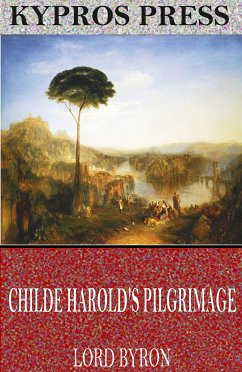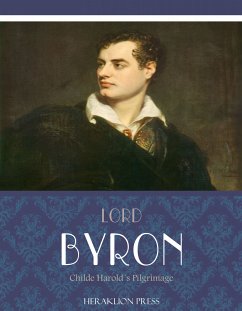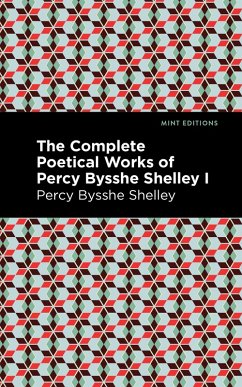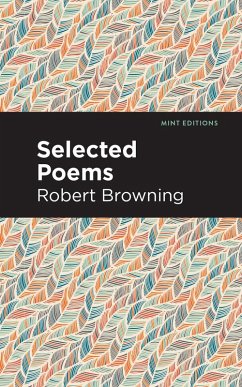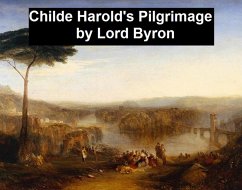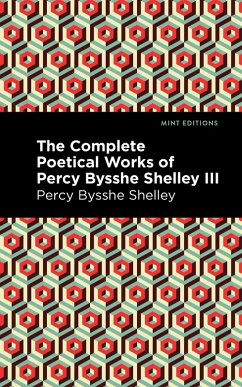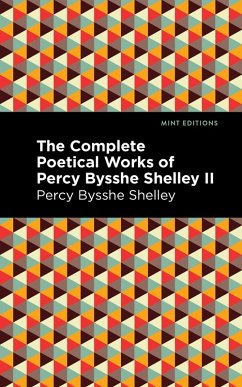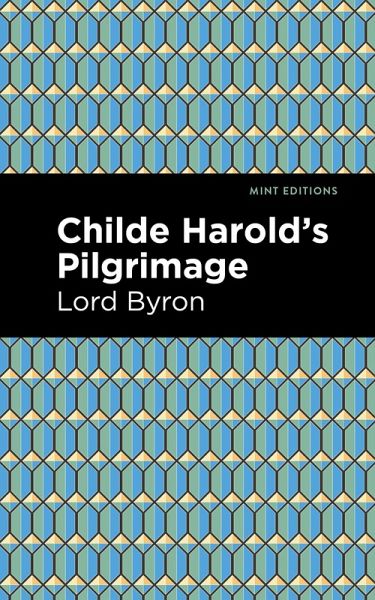
Childe Harold's Pilgrimage (eBook, ePUB)
Versandkostenfrei!
Sofort per Download lieferbar
5,99 €
inkl. MwSt.
Weitere Ausgaben:

PAYBACK Punkte
3 °P sammeln!
Childe Harold's Pilgrimage (1812-1818) is a book length poem by British Romantic Lord Byron. Published in cantos, the narrative poem is arranged in four parts, each following the journey of Harold, a character based on Byron himself. Childe Harold's Pilgrimage established Byron's reputation as a leading poet of his era, laying the foundation for many of the elements of Romantic poetry-melancholy, sublime and beautiful landscapes, a wandering hero-that would inspire generations of writers, artists, and musicians to come.Harold, a young and deeply unsatisfied man, wanders across a Europe divided...
Childe Harold's Pilgrimage (1812-1818) is a book length poem by British Romantic Lord Byron. Published in cantos, the narrative poem is arranged in four parts, each following the journey of Harold, a character based on Byron himself. Childe Harold's Pilgrimage established Byron's reputation as a leading poet of his era, laying the foundation for many of the elements of Romantic poetry-melancholy, sublime and beautiful landscapes, a wandering hero-that would inspire generations of writers, artists, and musicians to come.
Harold, a young and deeply unsatisfied man, wanders across a Europe divided by war. In Spain and Portugal, he observes the horrible aftermath of French occupation. While in Greece, though inspired by its classical architecture and immense beauty, he is overcome with grief by the daily realities of life under the control of the Ottoman Empire. Harold makes his way to Belgium, where he visits the battlefield at Waterloo before departing for Switzerland by way of the Rhine. Toward the end of his pilgrimage, Harold travels from Venice throughout Italy, observing its natural wonders and musing on its storied history. Childe Harold's Pilgrimage-part fictional narrative, part autobiography-is a moving map of a young man's mind and a continent's historical experience. It is both a record of Romanticism's influence on literature and psychology and a testament to the profound influence of trauma and conflict on the individuals and cultures of nineteenth century Europe.
This edition of Lord Byron's Childe Harold's Pilgrimage is a classic of English literature and Romanticism reimagined for modern readers.
Since our inception in 2020, Mint Editions has kept sustainability and innovation at the forefront of our mission. Each and every Mint Edition title gets a fresh, professionally typeset manuscript and a dazzling new cover, all while maintaining the integrity of the original book.
With thousands of titles in our collection, we aim to spotlight diverse public domain works to help them find modern audiences. Mint Editions celebrates a breadth of literary works, curated from both canonical and overlooked classics from writers around the globe.
Harold, a young and deeply unsatisfied man, wanders across a Europe divided by war. In Spain and Portugal, he observes the horrible aftermath of French occupation. While in Greece, though inspired by its classical architecture and immense beauty, he is overcome with grief by the daily realities of life under the control of the Ottoman Empire. Harold makes his way to Belgium, where he visits the battlefield at Waterloo before departing for Switzerland by way of the Rhine. Toward the end of his pilgrimage, Harold travels from Venice throughout Italy, observing its natural wonders and musing on its storied history. Childe Harold's Pilgrimage-part fictional narrative, part autobiography-is a moving map of a young man's mind and a continent's historical experience. It is both a record of Romanticism's influence on literature and psychology and a testament to the profound influence of trauma and conflict on the individuals and cultures of nineteenth century Europe.
This edition of Lord Byron's Childe Harold's Pilgrimage is a classic of English literature and Romanticism reimagined for modern readers.
Since our inception in 2020, Mint Editions has kept sustainability and innovation at the forefront of our mission. Each and every Mint Edition title gets a fresh, professionally typeset manuscript and a dazzling new cover, all while maintaining the integrity of the original book.
With thousands of titles in our collection, we aim to spotlight diverse public domain works to help them find modern audiences. Mint Editions celebrates a breadth of literary works, curated from both canonical and overlooked classics from writers around the globe.
Dieser Download kann aus rechtlichen Gründen nur mit Rechnungsadresse in A, D ausgeliefert werden.




